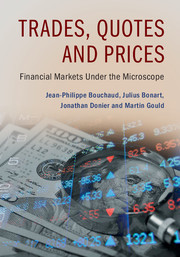Description
Trades, Quotes and Prices
Financial Markets Under the Microscope
Authors: Bouchaud Jean-Philippe, Bonart Julius, Donier Jonathan, Gould Martin
A deep-dive into the heart of modern financial markets, the authors explore why and how people trade - and the consequences.
Language: English
Subject for Trades, Quotes and Prices:
Approximative price 83.43 €
In Print (Delivery period: 14 days).
Add to cart
Publication date: 03-2018
460 p. · 17.8x25.3 cm · Hardback
460 p. · 17.8x25.3 cm · Hardback
Description
/li>Contents
/li>Biography
/li>
The widespread availability of high-quality, high-frequency data has revolutionised the study of financial markets. By describing not only asset prices, but also market participants' actions and interactions, this wealth of information offers a new window into the inner workings of the financial ecosystem. In this original text, the authors discuss empirical facts of financial markets and introduce a wide range of models, from the micro-scale mechanics of individual order arrivals to the emergent, macro-scale issues of market stability. Throughout this journey, data is king. All discussions are firmly rooted in the empirical behaviour of real stocks, and all models are calibrated and evaluated using recent data from Nasdaq. By confronting theory with empirical facts, this book for practitioners, researchers and advanced students provides a fresh, new, and often surprising perspective on topics as diverse as optimal trading, price impact, the fragile nature of liquidity, and even the reasons why people trade at all.
Preface; Part I. How and Why Do Prices Move?: 1. The ecology of financial markets; 2. The statistics of price changes: an informal primer; Part II. Limit Order Books: Introduction: 3. Limit order books; 4. Empirical properties of limit order books; Part III. Limit Order Books: Models: 5. Single-queue dynamics: simple models; 6. Single-queue dynamics for large-tick stocks; 7. Joint-queue dynamics for large-tick stocks; 8. The Santa Fe model for limit order books; Part IV. Clustering and Correlations: 9. Time clustering and Hawkes processes; 10. Long-range persistence of order flow; Part V. Price Impact: 11. The impact of market orders; 12. The impact of metaorders; Part VI. Six Market Dynamics at the Micro-scale: 13. The propagator model; 14. Generalised propagator models; Part VII. Adverse Selection and Liquidity Provision: 15. The Kyle model; 16. The determinants of the bid–ask spread; 17. The profitability of market making; Part VIII. Market Dynamics at the Meso-scale: 18. Latent liquidity and Walrasian auctions; 19. Impact dynamics in a continuous-time double auction; 20. The information content of prices; Part IX. Practical Consequences: 21. Optimal execution; 22. Market fairness and stability; 23. Appendices; Index.
Jean-Philippe Bouchaud is a pioneer in Econophysics. He co-founded the company Science and Finance in 1994, which later merged with Capital Fund Management (CFM) in 2000. In 2007 he was appointed as an adjunct Professor at École Polytechnique, where he teaches a course on complex systems. His work focuses on the physics of disordered and glassy systems, granular materials, the statistics of price formation, stock market fluctuations and the modelling of financial risks. He was awarded the Centre national de la recherche scientifique (CNRS) Silver Medal in 1995, the Risk Quant of the Year Award in 2017 and is the co-author along with Marc Potters of Theory of Financial Risk and Derivative Pricing (Cambridge,2009).
Julius Bonart is a lecturer at University College London where his research focuses on market microstructure and market design. Before, he was a research fellow at CFM and Imperial College of Science, Technology and Medicine, University of London where he investigated price impact, high-frequency dynamics, and the market microstructure in electronic financial markets. Julius Bonart obtained his Ph.D. in Statistical Physics from Pierre-et-Marie Curie University (Paris).
Jonathan Donier completed a Ph.D. at University Paris 6 with the support of the Capital Fund Management Research Foundation. He studied price formation in financial markets using tools from physics, economics and financial mathematics. After his Ph.D., he carried on his research in a music industry start-up that joined Spotify in 2017, where he now serves as a Senior Research Scientist.
Martin Gould currently works in the technology sector and was previously a James S. McDonnell Postdoctoral Fellow in the CFM-Imperial Institute of Quantitative Finance, which is part of the Department of Mathematics at Imperial College of Science, Technology and Medicine, University of Londo. Martin holds a D.Phil. (Ph.D.) in mathematics from the University of Oxford, Part III of the Mathematical Tri
Julius Bonart is a lecturer at University College London where his research focuses on market microstructure and market design. Before, he was a research fellow at CFM and Imperial College of Science, Technology and Medicine, University of London where he investigated price impact, high-frequency dynamics, and the market microstructure in electronic financial markets. Julius Bonart obtained his Ph.D. in Statistical Physics from Pierre-et-Marie Curie University (Paris).
Jonathan Donier completed a Ph.D. at University Paris 6 with the support of the Capital Fund Management Research Foundation. He studied price formation in financial markets using tools from physics, economics and financial mathematics. After his Ph.D., he carried on his research in a music industry start-up that joined Spotify in 2017, where he now serves as a Senior Research Scientist.
Martin Gould currently works in the technology sector and was previously a James S. McDonnell Postdoctoral Fellow in the CFM-Imperial Institute of Quantitative Finance, which is part of the Department of Mathematics at Imperial College of Science, Technology and Medicine, University of Londo. Martin holds a D.Phil. (Ph.D.) in mathematics from the University of Oxford, Part III of the Mathematical Tri
© 2024 LAVOISIER S.A.S.

